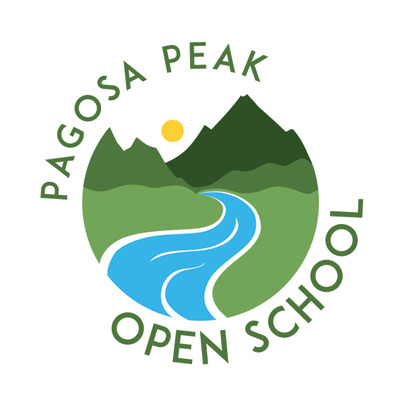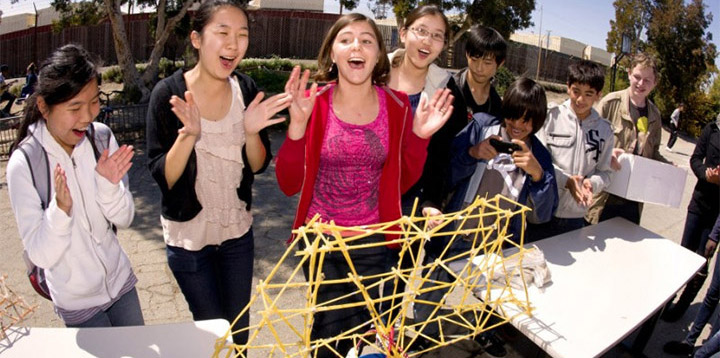CCRA.SL.1: Prepare for and participate effectively in a range of conversations and collaborations with diverse partners, building on others’ ideas and expressing their own clearly and persuasively.
— From the Common Core State Standards
It’s not really a strange idea… to allow school children to learn in much the same way that adults typically learn new skills… by becoming involved in multi-faceted “projects” that produce useful and meaningful end products — often as part of a collaborative team.
But it’s not the way public schools have typically operated for the past 100 years.
At the end of our 15-minute conversation, sitting at the picnic table overlooking the “still-under-construction” playground at Pagosa’s new charter elementary school — Pagosa Peak Open School — Erin Sanchez and I turned to the question of standards-based education, and more specifically, the Common Core State Standards.
Erin Sanchez has spent her educational career working as a high school and continuing education teacher, curriculum writer, video producer, and national PBL (“Project-Based Learning”) coach. According to her bio on the Buck Institute for Education (BIE) website:
“Her commitment to supporting PBL as a vehicle to equitable teaching and learning practices is paramount in her professional experience.. Erin has taught in both student-directed and teacher-directed PBL environments, and knows firsthand that PBL is a continuum, with each school/district having a unique vision and journey…”
Ms. Sanchez had been hired by Pagosa Peak Open School to train the staff in the latest PBL approaches and methods — especially, perhaps, approaches that will align the student ‘projects’ with state standards. When she began working with BIE seven years ago, the organization had 13 national trainers; they now have 92 trainers, and have worked with “hundreds of thousands of teachers around the globe,” Ms. Sanchez told me.
I’m a member of the Pagosa Peak board of directors, and the grandfather of future students who will be attending Pagosa Peak after it opens its doors in September. And as editor of the Daily Post, I’ve been writing for the past 12 years about education here in Pagosa Springs — doing my best to understand (and comment on) the successes and failures of “standards-based education” in Archuleta County.
Ms. Sanchez:
“PBL is growing — a lot — because of the Common Core. Because it requires that we teach critical thinking, and collaboration, and communication. And Project-Based Learning is really the best way to do that…”
I assume that the parents who’ve enrolled their children at Pagosa Peak have done so for various and sundry reasons, and that many of those parents — and many other people in the wider community — might wonder how a school built upon a base of “teacher-designed, student-produced projects” can meet the national Common Core State Standards adopted by the Colorado State Board of Education in August 2010.
I quoted Ms. Sanchez briefly in Part Two, yesterday. Here’s a continuation of that quote:
“From the inception of the project idea, it will be, ‘What do we want students to know? And be able to do?’ So the standards will be the building blocks for each project — and in particular, we look at standards that really need ‘application.’
“I mean, there are standards that are simply about acquisition of knowledge. But for the most part, what traditional schools miss is the ‘application’ of that knowledge. So, through a project, you are both acquiring the knowledge, and learning how to apply it. And usually, you will be creating some kind of tangible product, to demonstrate what you know.
“Every single product in a project is a way for students to say, ‘This is how I am mastering content and concepts…’
“The way [PBL] projects look now, as opposed to 30 years ago — even 10 years ago — they are just much more grounded in the state standards. And the Common Core provides us with this wonderful opportunity to embed standards, because the Common Core demands that we teach critical thinking, creativity, collaboration, communication, in a way that our old standards didn’t.
“If we’re meeting the Common Core standards, then we are doing projects.”
This idea — that students cannot fully meet Colorado’s educational goals without becoming involved in collaborative, creative projects that demand the development of critical thinking and communication skills — may strike some as a revolutionary departure from typical public education, where the focus has so often been on the acquisition of “facts” and “concepts.”
But as Ms. Sanchez explains, even the teaching of facts and concepts can be done more effectively, if students are involved in producing meaningful products.
“You can look at almost any ‘standard’ and say, ‘Okay, where is this concept or skill used in the real world, outside of school?’ And you can usually find an industry that makes use of that particular standard. Then, you can ask, ‘Okay, what does that industry produce — and what process do they use to produce it?’
“And if you can embed that process into your classroom — the design and engineering process — and then apply that product?
“And then apply it to the place where the student lives? Applying it to Pagosa Springs. How much more impactful is that? So then, standards are no longer abstract. And I think that’s pretty cool.”
One of the issues facing Pagosa Springs as a community — along with so many other rural communities across the nation — is the loss of its young people to urbanized areas. The median age of Colorado’s population is currently about 36 years (U.S. Census) but the median age in Archuleta County is 49 years… up from a median age of 41 years back in 2000.
Clearly, many factors play into the ongoing loss of younger people. Would it make a difference to the town’s overall character… if our school children grew up with an appreciation of their own community, by applying what they learn in school to the very town they live in?
Who knows?
As we mentioned in Part One of this article series, Pagosa Peak Open School will hold its Ribbon Cutting Ceremony at 5:30pm next Wednesday, August 30, to be followed by a taco bar and tours of the school. Community members are invited to enjoy dinner, view the facility, meet the staff, and pick up school information. The school is located on the first floor of the Parelli Building at 7 Parelli Way, near Walmart in Aspen Village.
The charter school phone number is 970-317-2151. Give us a call if you have questions.


